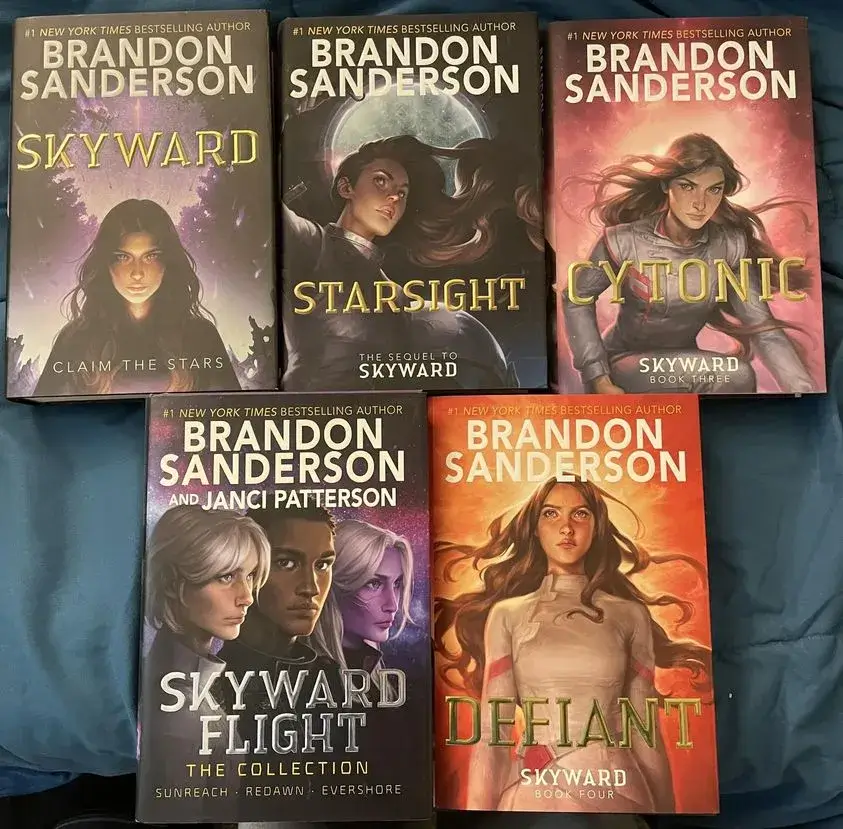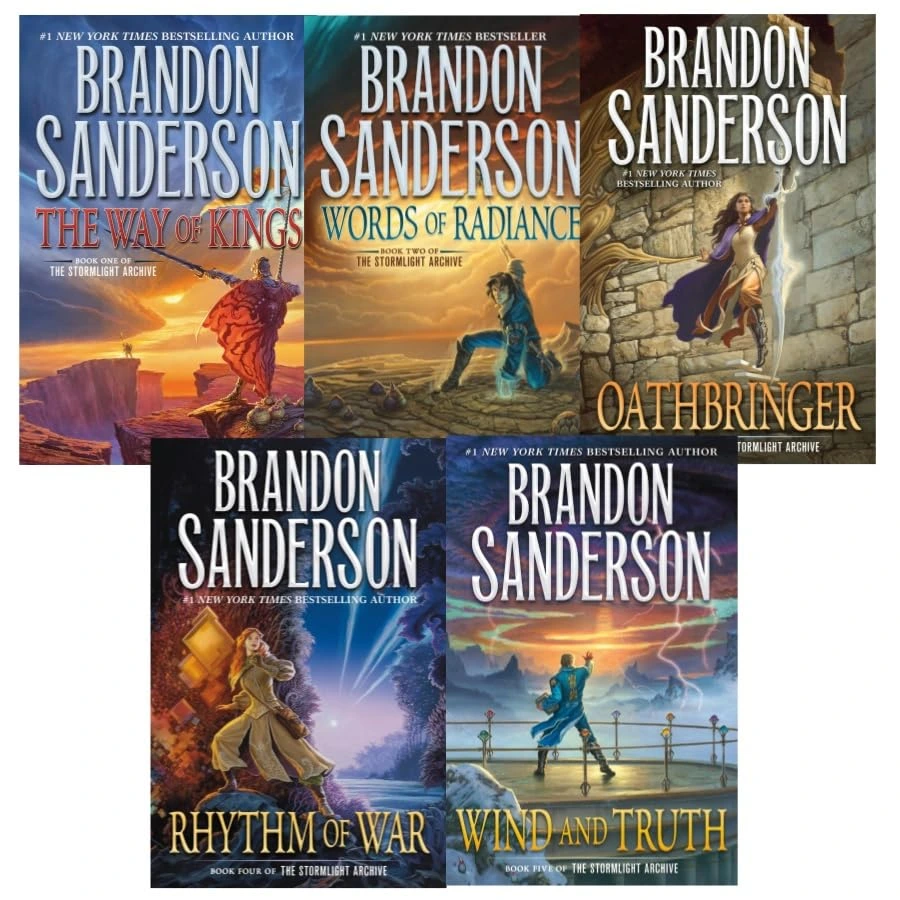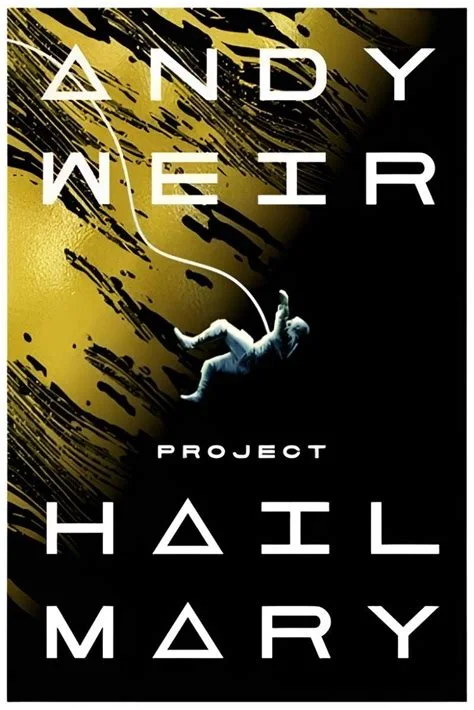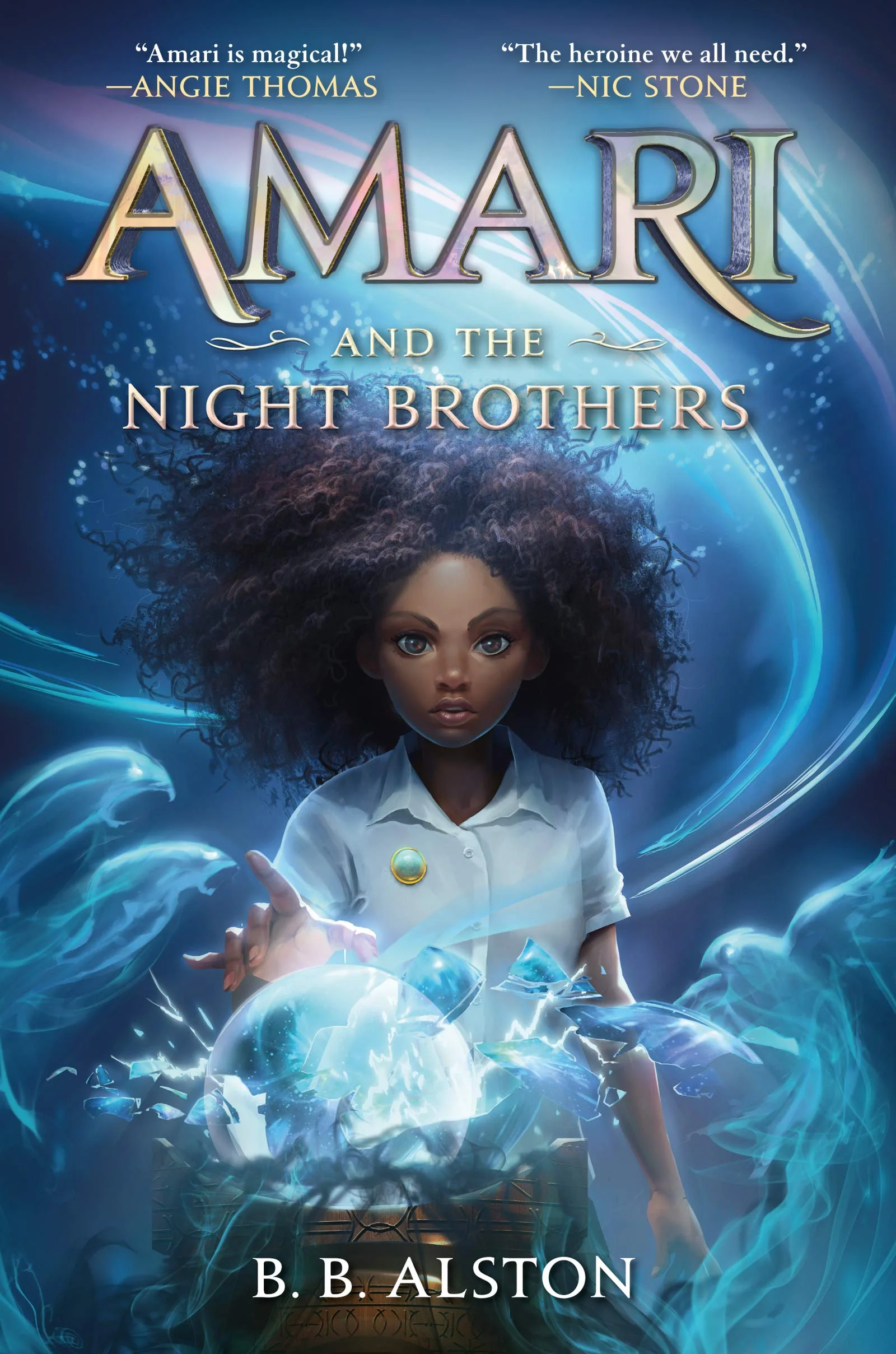Some years ago, I wrote a quick update about finishing the first two books of the Skyward series. This update was in Dutch, because back then my entire blog was in Dutch. Sorry.
I was very positive about the first book. I was still positive about the second one, but also a bit confused about where the series was going and how it felt … different.
Well, now the final two books have also released and we have ourselves a finished book series! I finished it last week and will try to communicate my thoughts about the Skyward series. Because I already wrote about it before, and don’t feel like translating the entire Dutch article, this won’t be a full-blown review but just a short summary of my thoughts.
The first part of this article has NO SPOILERS. I will only talk in more detail, using spoilers, after the heading “Deep Dive”.
Credit for the cover image goes to Author Jeffrey Lee and his Facebook post about the series. It was the only thing I could find with all book covers. All the others only had the first 3 books for some reason, as if the 4th book took too long and everyone impatiently made a picture of what they had.
The good parts
Brandon Sanderson has stated that his stories really started to shine when he learned to revise. I think series like these really showcase that. All the storylines are neatly wrapped up. Everything falls into place. All major characters get their moments and their endings. Powers attained or explored during earlier books are used properly at later times.
I can’t fault the stories on that. They are streamlined, focused, leave no holes, and are competently written.
As stated, the first novel is very good. Great mysteries, great character tensions, great worldbuilding, and it all flows neatly from start to finish.
The second novel is good, but very different. It took me some time to adjust, and it’s like it took Brandon some time to adjust too.
Then the third novel is completely different. It felt to me like reading a new series, as Brandon was grasping for a structured story thread here. (Which ends up being part of the underlying mystery, so I’ll forgive him that.) This felt like the most “difficult” novel to get through and to care about.
The final novel is kind of a return to form. It’s mostly interesting because of how many things it resolves and answers, not because of anything else that happens in the story. It’s all very well thought-out and written, but I just couldn’t feel anything more than “it’s fine, let’s just see how it ends” while reading this entire book.
So my praise will mostly come from the elements I praised in the first novel.
The entire series hinges on a few mysteries, and each of them is interesting and well executed. I obviously can’t say more without spoilers.
The main character (Spensa) is interesting and active, which is good. She is an outcast with clear skills but also flaws, which creates constant tension with those around her. This tension isn’t used for cheap suspense or stupid sequences that feel unrealistic—instead, it plays out in a way that just feels more interesting and natural.
It helps that the main supporting cast is interesting too. Though some of them blend together in my mind, most of them have a clearly distinct personality, skill set, or way of speaking. You get to know them one at a time and learn to appreciate each one, especially those that offer our heroine a helping hand.
The decisions made in books 2 and 3, which effectively detach Spensa from all those fun characters you discovered in book 1, therefore baffle me. The stories are fine on their own, but you just instantly lose connection when almost all your characters are sidelined. It’s as if Lord of the Rings left Frodo out of the entire second book, deciding to focus on political intrigue and romance in some other forgotten place.
And last but not least, the worldbuilding. This is a part that shines brighter and brighter as you continue. Initially, this feels like a very “cliché” science-fiction setup. Abandoned post-apocalypse like planet with harsh living conditions, threats from space, space pilots shooting laser guns, etcetera. It’s one of the reasons I was initially hesitant to pick up the first book.
But as you continue, you find that Sanderson has implemented a few specific changes that make it fresh and interesting. Details about how space combat works that I’ve never seen before, but make every action scene better. Details about how general space trade and colonization works, relying on a fun mystery to unravel. A special kind of magic, which isn’t really magic and very “contained”, so it doesn’t ruin the rest of the story by just saying “we’ll let all the magicky people solve all our problems”.
The bad parts
As stated, I find no outright bad parts. It’s all solid writing from start to finish. I’d almost say “as expected”.
I only find … slow and difficult parts. Like decisions that baffle me, or long sequences where it feels like Sanderson just needed to fill another 100 pages or book 3 would be too flimsy.
They were never enough to cause me to stop reading. But my grade for the series—if I had to give one—only went down the more I read (after book 1), never up. It’s the typical issue. An author puts all they have into that first installment, drawing new readers and making a splash. But then they have to continue and they realize the story after that is just of a slightly lower quality in all departments.
Without giving spoilers, I can’t say much else.
So let’s talk spoilers now.
Deep Dive
I mentioned that the middle books completely remove Spensa from all the characters you got to know thus far. In book 2, Spensa is sent to a Superiority planet for a diplomatic/political mission (alone). In book 3, she purposely jumps into the Nowhere (alone) to try and understand her cytonic powers better.
This effectively means any updates or communication about what’s happening at home can only come in the interludes. (Of which there are only a handful per book.)
It feels very weird to have the main story be about Spensa slooowly trying to gain the trust of some other people, while knowing there’s a full-out war for survival going on somewhere else. It feels like focusing on the wrong thing. It makes the story feel extra useless and slow.
Perhaps because of that, when Spensa does finally return and join their mission, it feels like starting a new series. It feels wrong and weird. Maybe this was the intent—there’s a tiny thread about Spensa realizing how little she’s been at home and how she barely fits in anymore. But to me it just felt as if the books, after book 1, were trying to tell the wrong story all the time. As if the middle books were annoying obstacles we had to get over, so that book 4 could continue where book 1 left off.
Maybe it’s just me. Maybe I’ve changed too much since starting the series years ago.
The way Sanderson writes love and couples has always been funny to me. He pretends as if so much as a kiss is extremely risque. (If you check all the books, the number of times we get Spensa and Jorgen actually behaving like a real couple of people loving each other … is basically zero.)
It’s just not believable to me that two people madly in love with each other would barely spend time together and not even touch each other when nearby. But again, that might also be my bias, as I’m a very physical person and not bound by any made-up rules about sexuality.
Anyway, it’s a shame! Because I think their relationship could’ve been a strong emotional core for the series and an even more interesting thread. Book 4 explores the struggles with having a relationship with someone who’s technically under your command, but I barely cared because their relationship was so underwritten. It was as if Sanderson also just realized “oh that could create tension”, then dropped it a few chapters later because it wasn’t really doing anything.
I liked the different weapons and systems of their starfighters. A simple rule like “we have an EXTREMELY powerful weapon, but to use it we must turn off everything else including our shield” does wonders here. The story repeats these rules just often enough that you know them, but don’t get annoyed by the details.
The idea to hinge galactic peace on the ability to teleport to anywhere is also interesting. Especially when it’s a secret that humans need to figure out, and the answer has been staring you in the face along: the slug that Spensa befriended at the start. That’s good. Good mystery, good world building, good continuation.
Book 4 very hastily introduces more and more of those slug types. Which is interesting—I would’ve surely done the same—but should’ve been given waaaay more time. Now I was forced to “go with the flow” a few times, just accepting that they apparently had these slugs which had these specific abilities they’d use now.
(Then again, there’s that fifth book that isn’t part of the original series that probably sets this up. I didn’t read that. Is it a mistake for an author to make such a story optional? When it has implications for the final book in the main series? Not sure. I surely do the same thing with my own episodic books. They are standalone, but it helps to read them in order, because I can’t truly make each story 100% standalone in a shared narrative.)
All in all, those middle two books just feel like a fever dream. Like … are they even real? :p Did it even happen? Were they necessary in any way?
Yes, things happen there that become important later—such as Spensa meeting other species, understanding the Nowhere, meeting the Superiority leaders. In the final book, she calls upon those earlier friends, and she wins partially thanks to a deeper understanding of the things she explored. But that just feels like 2% of those books. The story around them feels a bit … unnecessary?
They could’ve been merged into one book. Or these developments could’ve been put into a different container, a different narrative, that saw Spensa stay with the other characters and involve them more. That ensured the later books were more similar in tone and quality to book 1.
Normally, my interest in a series grows as I read more. Because the world expands, characters I know get to do interesting things now, mysteries set up long ago are finally resolved, etcetera. But this time, it just kind of … petered out as I read the final hundred pages of the final book.
Conclusion
There’s no real conclusion. This is just my chain of thought, partially written right when I finished the series, and partially a few weeks later after I had time to think about it some more.
Book 1 is great. The later books are fine, but feel like a different genre or series altogether. At no point does it get bad or did I actually stop reading, but I also didn’t feel anything during the final book.
I guess you can’t leave your entire main cast of characters in the dust after book 1, then expect me to remember and care about them in book 4.
Maybe the first book just misled me. I expected four more books in the same style, tone and setting. Instead, Sanderson seemed to have an entirely different plan in mind—something that turned every book into a different genre. He executed and polished that plan as well as he could, making the series readable and neatly tied up, but not as good as I think it could’ve been.
Those are my thoughts on Skyward. Do I recommend the first book? Absolutely. Do I recommend the series? Eeeeeh.



